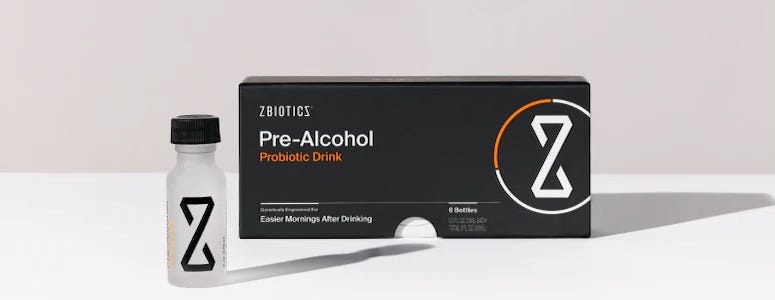I ain't sayin' I beat the devil, but I drank his beer for nothing. - Kris Kristofferson
I asked a visiting American friend to bring me a package of ZBiotics, after hearing it advertised on a podcast. ZBiotics Pre-Alcohol describes itself on its website as "genetically engineered by a team of PhD microbiologists" and claims to be a "probiotic drink that breaks down the byproduct of alcohol responsible for rough mornings after drinking". It is not currently available in Canada.
I am sceptical of any product that claims to lessen the effects of alcohol overindulgence. This became particularly true after reading Shaugnessy Bishop-Stall's 2018 memoir Hungover, in which he spends a decade looking for a cure. Success he told me, when I interviewed him on publication, was only ever partial, and often came with great cost. The only real cure for a hangover is the time it takes for the body to heal itself.
The chief reason that hangovers are not "curable" is that the discomfort they manifest is self-made. The "byproduct of alcohol responsible for rough mornings after drinking" that the Zbiotics website claims it can break down is Acetaldehyde. Acetaldehyde is known to be toxic and it's produced in the body when enzymes, principally made by the liver, break down molecules of alcohol.
One's hangover is "cured" when another set of enzymes again made principally by the liver break down the acetaldehyde into acetate, a harmless chemical analogous to vinegar. This, the body further breaks down into water and carbon dioxide. (This is my layman's understanding of alcohol metabolism; I am not a doctor.)
The reason the ZBiotics ads and website claims caught my attention is that they tracked with my crude understanding of what a hangover is, and how the body naturally processes one out of it. The bacteria in their probiotic drink has been genetically modified to create an enzyme that mimics the ones the body makes naturally that breaks toxic acetaldehyde into harmless acetate. To try to understand more, I relied on a podcast interview with the company's founder and CEO, Zack Abbott, who holds a PhD in bio-engineering.
According to Abbott, while the liver is primarily responsible for metabolizing alcohol, some of it is also broken down in the stomach and small colon. Presumably, this is alcohol that has yet to be absorbed into the bloodstream. The good news is that a healthy liver is extremely efficient at both breaking down alcohol into to acetaldehyde and then quickly breaking the toxin down into acetate. The bad news is that the stomach is not.
The stomach is slow to metabolize alcohol, especially the crucial second stage. The poisoning of the hangover happens when alcohol that's still in the stomach goes through the first stage of conversion to acetaldehyde, but gets absorbed into the bloodstream before under going the second metabolization. This stomach derived acetaldehyde flowing around in one's bloodstream will eventually get processed by the liver, but not before circulating to wreak hangover havoc around the body.
This post is free, but many aren’t. Support my work and this newsletter by becoming a MJ Wine Box paid subscriber. Sign up today and recieve 20% off for life. Click on the button below to redeem this offer.
Or, spread joy and insider wine knowledge with a gift subscription for friends, family, colleagues or whoever and save 20% off of the regular fee.
ZBiotics claim that their GMO bacteria-made enzymes will process acetaldehyde in the stomach before it gets into the blood. So, it's not a cure, it's a prophylactic. It's also far from a guarantee since different people naturally metabolize different amounts of alcohol differently. Still, it seemed promising enough to try.
I'm not a scientist and I didn't set-up anything like a controlled experiment. I just tried taking ZBiotics with varying amounts of alcohol. I wanted to see if I could detect a difference of how I felt the morning after having a few or more than a few drinks. If I did, then I was interested to see if there was a point of no return where a large amount of alcohol would result in a hangover despite the extra enzymes produced by the probiotic. (Kids, don't try this at home.)
It won't surprise regular readers of this Substack, or my column at The Hub, to learn that it is generally known among my friends that I have a relatively high tolerance to alcohol. I asked the Google AI feature what "high tolerance" meant, and it supplied this answer: "...a person with a high tolerance might need to drink more alcohol to experience the same effects they felt initially, or they might experience fewer effects from a given amount of alcohol compared to someone with low tolerance."
No comment on the first part, but the second part applies to hangover; at least for me. It's not that I am incapable of inducing a terrible hangover. I am, but I believe my morning after floor is higher than most people's and I suspect my ceiling is lower. Until I began to read up on alcohol and acetaldehyde metabolization, I would have said my condition was simply a case of putting in the hours of practice. Now, I think it might have more to do with being genetically blessed with particularly efficient enzyme production.
While, like a tall basketball player or a swimmer with a wide wingspan, I may have the built in advantage of high tolerance, I am also over 50 years old. My tolerance is certainly lower, and my hangover experience is appreciatively worse than it was 15 years ago. And, under the influence of frontal cortex suppressing alcohol, I am more than capable of making poor choices after a few drinks (like having a few more), I was pretty sure that if ZBiotics really worked, I would know it.
The first few times I took a vial of ZBiotics before having drinks in the evening, I was measured. I drank only wine, while preparing dinner, during it and after, while watching TV. I would describe this behaviour as "naughty school night", where I crossed the Rubicon by pouring another glass past the number that I knew would affect me in the morning. On a Friday night, I pushed it a little further, but not by too much, since I ended up falling asleep on the couch.
The last time I took it was before my first glass of wine on Saturday night. I was getting dressed to go out to a dinner party to celebrate the close together birthdays of two close friends. The part would assemble a group of friends who have known each other for a long time, in some cases since undergraduate days. In sociological terms, we have self-selected each other because we like to eat, drink and dance. And when we do, we don't count our drinks or look too closely at the recycling bin. This evening would see many bottles of wine opened well into the night and it would see how far ZBiotics could be pushed and still be effective.
I believe ZBiotics works, or at least it works on me. It did not cancel out all the effects of drinking alcohol, but it noticeably seem to eliminate the wretched feelings of being poisoned by acetaldehyde. The 7AM wake-ups after the naughty school nights were not as bright eyed and bushy tailed as the ones that happen after a dry day and night. But, I felt no impediment to functioning, whether at my desk or at the gym on any level that I might have otherwise.
The mid-20th century British novelist novelist Kingsley Amis' contribution to hangover scholarship is too great to get into detail about in this post, but he deserves credit for identifying the "meta-physical hangover." It's the emotional one that involves feeling of regret, guilt, low self-esteem. It is arguably a greater drag on morning after productivity than headaches, nausea or the other symptoms of its twin, the physical hangover.
After experiencing the effects of ZBiotics, I came to believe the bad feelings of the metaphysical hangover are largely due to acetaldehyde poisoning. (Unless, of course, one has actually done something to be ashamed or feel guilty about.) I came to this conclusion on the Sunday morning coming down from the Saturday night party. I didn't bound out of bed, but I was surprised to realize that I didn't feel too bad.
What ZBiotics can't do is anything about the effects off alcohol in the bloodstream. Taking it will not keep one's inhibitions safely intact, nor prevent one from making poor choices. It also won't help with alcohol's disruption of the body's natural sleep ability.
On the weekdays I took ZBiotics, I didn't drink enough to seriously disrupt my sleep and I was refreshed after six or seven and a half hours of sleep. After the big party, I woke feeling tired and groggy, even though I slept in and was in bed for longer. The day after the party I was fatigued and was not up for any high level tasks beyond walking the dog or buying a few groceries.
I am presenting feelings as though they are findings of fact. They're not, and it's entirely possible that what I experienced was at least in part a placebo effect. The real value to ZBiotics might be that it introduces or maintains an element of mindfulness to drinking alcohol. It costs about $15 ($US 10) a vial, so once that's spent, there's an onus to get one's money's worth and not over do it.
Or, if the plan is to over do it, then it's worth remembering that for all the help the enzymes might give, a day of recovery followed by a good night's sleep is still required to back to full health. But at least that day might not be quite as bad as it could have been.





